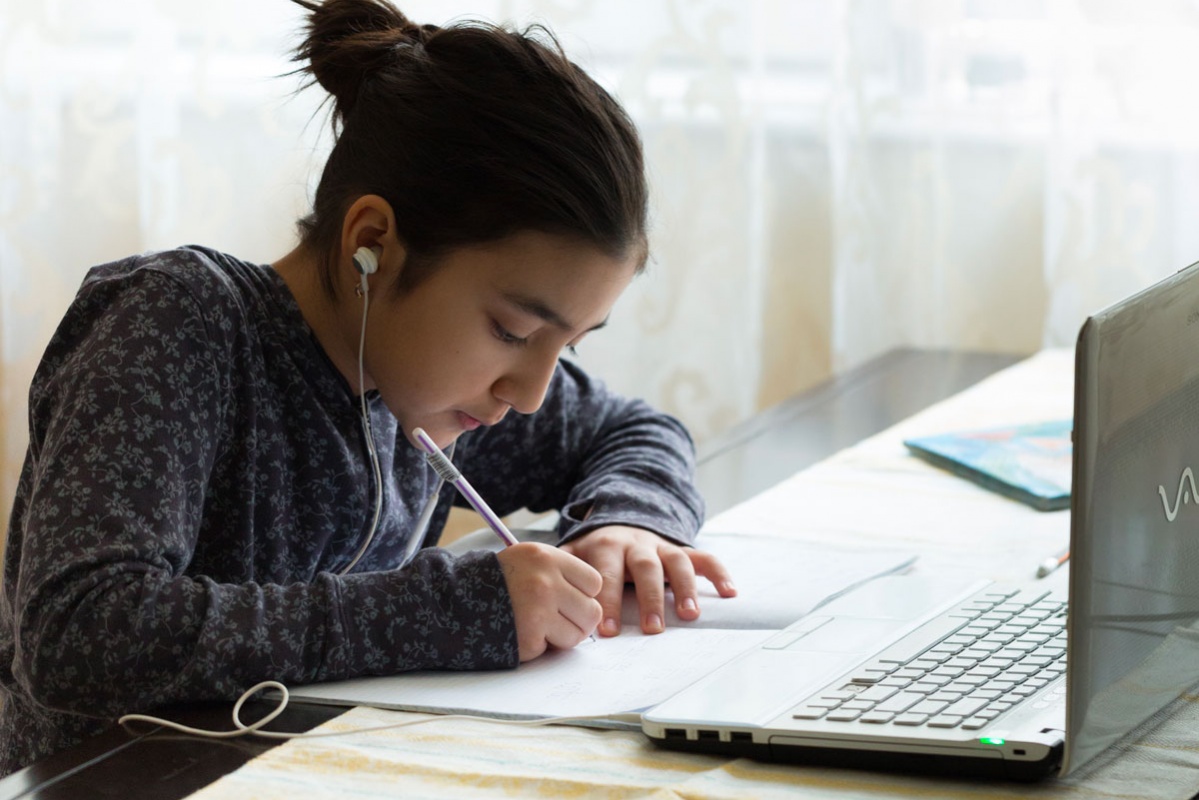

How To Help Children Become Successful Online Learners
When COVID-19 hit in March, when teachers were forced to reimagine their lesson plans in a matter of days and dining rooms turned into classrooms overnight, we were all scrambling to keep our kids’ education running in any way possible.
But as parents and teachers quickly learned, every kid’s experience this spring looked different. Some students had regular access to daily Zoom lessons. Others were left to navigate a stack of worksheets with their parents (parents who—horror of horrors—had to relearn junior high geometry). Worst of all, children in underserved areas often didn’t receive the technology they needed until late in the semester.
While we all did the best we could with the materials available, the pandemic academic slide is already apparent, especially among children of color, those with special needs and those in remote communities with limited access to technology. Researchers with Brown University found that students will lose on average three months’ worth of reading gains and five months’ worth of math gains due to the spring COVID-19 shutdown.
As our kids return to remote learning this fall, whether 100 percent online or through a hybrid set-up, schools are going above and beyond to help their students adjust to this new normal and feel reconnected to the classroom. But as parents, there are steps we can take as well to ease the transition.
Take advantage of the technology available
To streamline the learning process for their students, school districts across the region spent the summer revamping their approach to virtual education, from exploring new technologies to helping teachers restructure their lesson plans for an online environment.
The Rockwood School District, for example, now leverages the Canvas Learning Management Platform to strengthen communication between educators and families and hold students accountable for their work. The system offers features such as inbox messaging, to-do lists, course information, and assignments for students as well as the ability for parents to monitor their children’s learning, communicate with teachers, and be aware of overdue assignments.
According to Brian Reed, coordinator of STEM & digital learning K-12 for the district, this transparency allows parents the opportunity to better understand how to help their students with homework, ask leading questions about their school day to uncover concerns (and wins!), and identify any struggles they may be facing.
Said Reed, “Support your students in talking about their anxieties and apprehensions about school, especially in an online learning environment. The social-emotional well-being of our students is an important component of their learning and also in how we manage the classroom and our relationships with them. If you happen to notice anything of which the teacher should be made aware, please express that to the teacher so that we can support you and the student, and leverage other District resources if needed.”
Create the optimal space for learning
Paying attention isn’t most humans’ strong suit. If we as adults can barely make it through a work Zoom meeting without our minds drifting, a seven-year-old is no doubt going to struggle with online classes and activities.
According to researchers with the SLU PRiME Center, a non-partisan research center committed to conducting and sharing research that leads to better policies, educational outcomes, and opportunities for all students, establishing a set schedule is critical to a child’s success by providing the structure they need—even when the traditional 8 a.m to 3 p.m. model is thrown out the window.
“Setting and adhering to a schedule will be important,” said Dr. Evan Rhinesmith, director of research and evaluation at the center. “It may be a different setting, and online learning is not something many students have experienced prior this past spring, but it’s still school. Knowing when your student’s teachers are offering live office hours and lessons, when asynchronous video lessons are posted, and staying on top of assignments is essential to normalize online learning.”
Reed suggested establishing a distraction-free learning zone, separate from the family’s common living space that offers plenty of light, is free from excess noise, and is comfortable, “but not too comfortable.” Offering breaks between classes, he said, will also help students mentally and physically prepare for the next class. A quick run around the backyard, for instance, can help kids burn off that energy that’s building up while a little quiet time on the couch can bring down their anxiety after a stressful class.
One key to optimal learning, said the experts, is to give your child some autonomy in how their school day looks. If you create the space you think they can benefit from without their input, their excitement about learning can deflate within minutes.
Remarked Dr. Molly I. Beck, research associate and data fellow in the SLU PRiME Center, “Online learning, while daunting, may help students develop more intrinsic motivation and take greater ownership of their education. We’ve talked about setting up a schedule as a way to set students up for success. Parents can help students develop that personal accountability by letting students design some (or all) of their learning schedule and environment. Parents can then check in periodically to see whether the schedule or learning environment helps or hinders their child’s schooling; this discussion will allow their child to reflect on their decisions and change what was not working.”
Find the steps to success
According to Dr. Beck, two resources the Center highlights in particular—Organizing Instruction and Study to Improve Learning and Six Strategies for Effective Learning—offer practices parents can incorporate into their child’s learning so they can become more successful in an online environment. Dr. Beck noted that these studies demonstrate students can learn and retain more if parents help:
- Spread learning out and allow for breaks as needed to refresh the mind
- “Interleave,” which can mean switching between ideas as you and your child work together, such as going from math to science and back to math
- Present concepts graphically if you can
- Use formative quizzes to recall information
- Describe ideas to make connections
- Set up a study schedule as mentioned
- And, research additional tools that can help determine how your child learns best at home
“Parents can help students, especially younger students, practice these steps to help them adapt to a learning environment that is considerably different than their structured school environment,” explained Dr. Beck. “In an Education Week blog post, teacher Larry Ferlazzo described these tips and brings up the importance of ‘modeling’ or demonstrating the actions and activities parents would want to see from their children—not only taking a class seriously, but demonstrating the importance of self-care, as well.”
Don’t go it alone
As we navigate through these first few weeks of our new normal, never forget that unless they’re technological masterminds and have conflict-free relationships with their kiddos, every other parent is in the same storm-hit boat.
Talk with other parents in your children’s classes to learn from solutions they’ve uncovered. Take advantage of your school’s parent Facebook groups (but please keep it drama-free and never use it as a space to criticize the school or teachers). And be sure to connect with your children’s teachers about any concerns while understanding they’re also facing frustrations with online learning, especially if they have kids of their own.
For additional help, the SLU PRiME Center has collected best-practice and research-backed resources on its website to help families, students and teachers alike.
And of course, realize there’s no one-size-fits-all plan for online learning. Every child is different, from how they learn to how fast they learn, and every parent needs to take a deep breath before diving into each school day, remembering this is a new journey for us all.
Said Dr. Rhinesmith, “It’s important to recognize that even though most students went through this in the spring, it was a different experience that is not going to necessarily translate to the fall. We’re about as close to being back to square one as possible. With that in mind, patience is going to be key. As much as we want to, we won’t be able to fully mirror the in-person learning experience with virtual learning. Accountability for students will come with trust and realistic expectations for what can be accomplished. Along with that, it is important that parents hold themselves accountable and staying consistent in what we hope to accomplish this school year.”

Metro East mom Nicole Plegge has written for STL Parent for more than 12 years. Besides working as a freelance writer & public relations specialist, and raising two daughters and a husband, Nicole's greatest achievements are finding her misplaced car keys each day and managing to leave the house in a stain-free shirt. Her biggest regret is never being accepted to the Eastland School for Girls. Follow Nicole on Twitter @STLWriterinIL




















